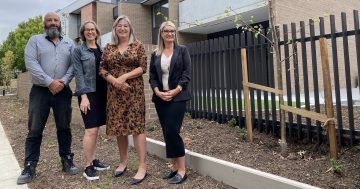
Public housing tenant Sandra Picker (pictured above) fears for her future after receiving a letter from the ACT Government’s Community Services Directorate stating that her application to be moved to a safer environment could not be progressed unless she provided the department with a list of police job numbers dating back years.
After experiencing a good deal of personal hardship in her life, Sandra has been gainfully employed and living in public housing for over two decades. The gentle-natured resident lives in the northside of Canberra and works at her local IGA.
Recently, Sandra wrote to Community Services explaining that she is in need of a knee replacement, and provided a letter from her doctor stating that it is no longer safe for her to walk up the flight of stairs of the public housing complex to her apartment. She also stated in her letter that she fears for her personal safety in her current living arrangement.
But instead of receiving correspondence to further assess her situation, Sandra received a bill for repairs to her door that was damaged due to an attempt to break and enter her home six years ago, and a letter stating that her case could not be further progressed beyond the normal waiting period, which can sometimes be up to ten years, unless she provided the department with a list of police job numbers to prove that she was living in an unsafe environment.
A spokesperson for the government department informed RiotACT that people with serious medical issues and of frail age may qualify for “prioritised allocation”. But, almost unable to walk up the stairs with only twenty per cent of her cartilage holding her knee together, Sandra has been left wondering what will happen to her if her knee collapses, which it could at any time, according to her doctor.
“I’ve always tried to do the right thing, and I’m not really sure what I need to do about getting all of these police job numbers,” she said.
The ACT has the second highest rate of homelessness in the country with almost 50 out of every 10,000 people in Canberra without a place to call home. And according to a Productivity Commission’s Report released earlier this year, the waiting list for public housing has increased by almost 900 people since 2010.
For many Canberrans, public housing is a crisis of an unrealisable hope.
Luckily enough, Sandra has a home but the question has to be asked: are we looking after our senior citizens well enough in the ACT? Are we giving special treatment to those who know how to rort the system instead of those who truly deserve the full welfare that Community Services has to offer.
And why is the government not doing all that they can for our elderly citizens by relocating Sandra to accommodation that suits her stage in life instead of making her wait in uncertainty and fear?




















